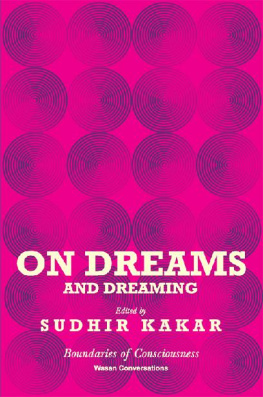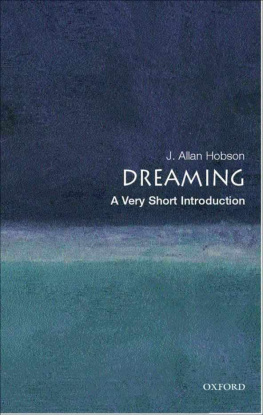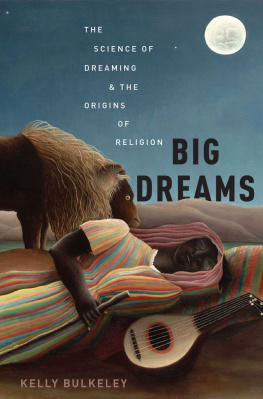Kelly Bulkeley - Big Dreams: The Science of Dreaming and the Origins of Religion
Here you can read online Kelly Bulkeley - Big Dreams: The Science of Dreaming and the Origins of Religion full text of the book (entire story) in english for free. Download pdf and epub, get meaning, cover and reviews about this ebook. year: 2016, publisher: Oxford University Press, genre: Romance novel. Description of the work, (preface) as well as reviews are available. Best literature library LitArk.com created for fans of good reading and offers a wide selection of genres:
Romance novel
Science fiction
Adventure
Detective
Science
History
Home and family
Prose
Art
Politics
Computer
Non-fiction
Religion
Business
Children
Humor
Choose a favorite category and find really read worthwhile books. Enjoy immersion in the world of imagination, feel the emotions of the characters or learn something new for yourself, make an fascinating discovery.

- Book:Big Dreams: The Science of Dreaming and the Origins of Religion
- Author:
- Publisher:Oxford University Press
- Genre:
- Year:2016
- Rating:3 / 5
- Favourites:Add to favourites
- Your mark:
- 60
- 1
- 2
- 3
- 4
- 5
Big Dreams: The Science of Dreaming and the Origins of Religion: summary, description and annotation
We offer to read an annotation, description, summary or preface (depends on what the author of the book "Big Dreams: The Science of Dreaming and the Origins of Religion" wrote himself). If you haven't found the necessary information about the book — write in the comments, we will try to find it.
Big Dreams: The Science of Dreaming and the Origins of Religion — read online for free the complete book (whole text) full work
Below is the text of the book, divided by pages. System saving the place of the last page read, allows you to conveniently read the book "Big Dreams: The Science of Dreaming and the Origins of Religion" online for free, without having to search again every time where you left off. Put a bookmark, and you can go to the page where you finished reading at any time.
Font size:
Interval:
Bookmark:

KELLY BULKELEY


Oxford University Press is a department of the University of Oxford. It furthers the Universitys objective of excellence in research, scholarship, and education by publishing worldwide. Oxford is a registered trade mark of Oxford University Press in the UK and certain other countries.
Published in the United States of America by Oxford University Press
198 Madison Avenue, New York, NY 10016, United States of America.
Oxford University Press 2016
All rights reserved. No part of this publication may be reproduced, stored in a retrieval system, or transmitted, in any form or by any means, without the prior permission in writing of Oxford University Press, or as expressly permitted by law, by license, or under terms agreed with the appropriate reproduction rights organization. Inquiries concerning reproduction outside the scope of the above should be sent to the Rights Department, Oxford University Press, at the address above.
You must not circulate this work in any other form and you must impose this same condition on any acquirer.
Library of Congress Cataloging-in-Publication Data
Names: Bulkeley, Kelly, 1962
Title: Big dreams : the science of dreaming and the origins of religion / Kelly Bulkeley.
Description: New York : Oxford University Press, 2016. |
Includes bibliographical references and index.
Identifiers: LCCN 2015034057 | ISBN 9780199351534 (cloth : alk. paper) | eISBN 9780199351558
Subjects: LCSH: Dreams. | Experience (Religion)
Classification: LCC BF1078 .B779 2016 | DDC 154.6/3dc23 LC record available at http://lccn.loc.gov/2015034057
For Hilary
Lately Ive been rereading psychology books,
and I have felt singularly defrauded.
All of them discuss the mechanisms of dreams
or the subjects of dreams, but they do not mention,
as I had hoped, that which is so astonishing,
so strangethe fact of dreaming.
JORGE LUIS BORGES, Nightmares
(Romeo): Peace, peace, Mercutio, peace!
Thou talkst of nothing.
(Mercutio): True, I talk of dreams,
Which are the children of an idle brain,
Begot of nothing but vain fantasy,
Which are as thin of substance as the air
And more inconstant than the wind...
WILLIAM SHAKESPEARE, Romeo and Juliet
THE VAST MAJORITY of dreams are forgotten. Wispy and amorphous, they evaporate quickly in the light of morning. Gone without a trace, as if they never happened.
A few of them, however, do not flee with the dawn. These unusual dreams possess a special vividness and intensity that makes them difficult if not impossible to forget. They burst across the threshold of waking awareness and seize conscious attention, imprinting themselves so deeply into memory they can be clearly recalled weeks, months, or even years later.
This book starts with the simple observation that a majority of dreams are immediately forgotten, while a few are highly memorable. A reasonable theory of dreaming should be able to account for both aspects of this observation, the tendency to forget most dreams and the tendency to intensely remember a few of them.
The conventional scientific approach has been to pay attention to just one side of the equation, focusing on recent dreams gathered from surveys or sleep laboratory experiments. These are mostly trivial dreams that would have been forgotten if someone had not prompted their recollection. Many researchers have built their theories using only these kinds of dreams, ignoring the more unusual and memorable types that tend not to appear in sleep laboratories or surveys. The result is a shallow and rather bland view of dreaming that excludes precisely those types of dreams people have always found most interesting and meaningful.
An alternative scientific approach is to reverse the order of significance. Instead of treating highly memorable dreams as marginal, make them the center of inquiry. Look at them not as trivial exceptions to the general rule of ordinary dreaming but as singular expressions of the tremendous potential of the dreaming mind.
This can be considered a Black Swan approach because it emphasizes the pivotal impact of rare phenomena on scientific theorizing. The basic idea goes back to the eighteenth-century Scottish philosopher David Hume and his concerns about the logical fallacy of overgeneralizing from limited experiences (also known as the problem of inductive reasoning). and I believe researchers who study dreams are in danger of falling into the same intellectual trap: too much focus on the White Swans of average, ordinary, forgettable dreaming, and not enough attention to the Black Swans of anomalous, extraordinary, highly memorable dreaming.
If we take this alternative approach of striving for better scientific knowledge of unusually intensified dreamswhat Carl Jung called big dreamsat least two important benefits will emerge.
First, we gain a much more comprehensive and integrated view of the nature of dreaming. More than 100 years after Sigmund Freuds monumental The Interpretation of Dreams, and more than 50 years after the breakthrough discovery of rapid eye movement (REM) sleep, scientists still do not have a consensus theory about why people dream and what their dreams mean. One of the biggest obstacles to progress has been the failure to appreciate the significance of rare but extremely impactful dreams. When we take into account the latest research on both ordinary and extraordinary types of dreams, a much clearer picture emerges of the nature of dreaming in its full range and potentiality.
Second, an improved scientific understanding of dreaming has surprisingly important implications for the study of religion. In a previous book, Dreaming in the Worlds Religions, I analyzed sacred texts, historical records, and anthropological reports to highlight the recurrent roles that dreams have played in religious and cultural traditions through history and around the world: communicating with divine beings, foreseeing future events, healing illnesses, and protecting against attack from evil powers, among others. From a conventional scientific perspective, based only on the study of ordinary dreams, these cross-cultural religious teachings appear bizarre and unintelligible. But once we take new research findings on highly memorable dreams into account, the cross-cultural religious teachings no longer seem so alien. In fact, we find that religious traditions through history have accurately described several types of big dreams that modern-day researchers have analyzed and explained in terms of their naturalistic roots in the human brain. The more we know about the science of big dreams, the more we can learn about the experiential origins of religious beliefs and practices.
I hasten to point out that this thesis is not original to me. It has a long and venerable history in the Western intellectual tradition, as the following quotes on pages 45 make clear.
These thinkers share the vital insight that dreaming has something to do with the way religious ideas and feelings get started in peoples minds
Font size:
Interval:
Bookmark:
Similar books «Big Dreams: The Science of Dreaming and the Origins of Religion»
Look at similar books to Big Dreams: The Science of Dreaming and the Origins of Religion. We have selected literature similar in name and meaning in the hope of providing readers with more options to find new, interesting, not yet read works.
Discussion, reviews of the book Big Dreams: The Science of Dreaming and the Origins of Religion and just readers' own opinions. Leave your comments, write what you think about the work, its meaning or the main characters. Specify what exactly you liked and what you didn't like, and why you think so.




